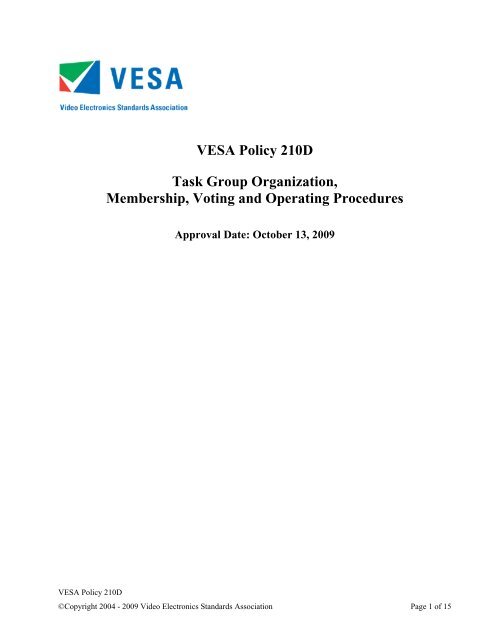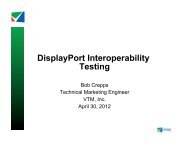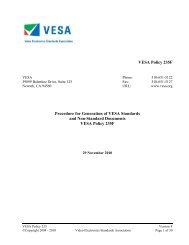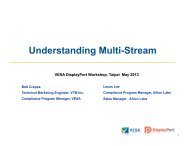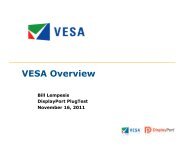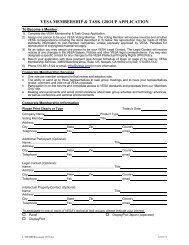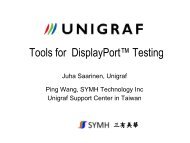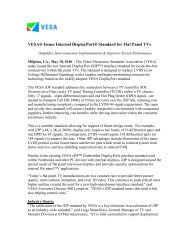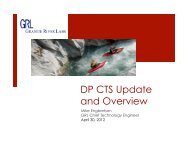VESA Policy 210D Task Group Organization, Membership, Voting ...
VESA Policy 210D Task Group Organization, Membership, Voting ...
VESA Policy 210D Task Group Organization, Membership, Voting ...
Create successful ePaper yourself
Turn your PDF publications into a flip-book with our unique Google optimized e-Paper software.
<strong>VESA</strong> <strong>Policy</strong> <strong>210D</strong><br />
<strong>Task</strong> <strong>Group</strong> <strong>Organization</strong>,<br />
<strong>Membership</strong>, <strong>Voting</strong> and Operating Procedures<br />
Approval Date: October 13, 2009<br />
<strong>VESA</strong> <strong>Policy</strong> <strong>210D</strong><br />
©Copyright 2004 - 2009 Video Electronics Standards Association Page 1 of 15
Table of Contents<br />
1 <strong>Organization</strong> of <strong>VESA</strong> <strong>Task</strong> <strong>Group</strong>s ...............................................................................................4<br />
1.1 <strong>Membership</strong> ...............................................................................................................................4<br />
1.2 <strong>Task</strong> <strong>Group</strong> Officers ..................................................................................................................4<br />
1.3 Forming Subgroups....................................................................................................................4<br />
1.4 Disbanding a Subgroup..............................................................................................................4<br />
2 Roles of <strong>Task</strong> <strong>Group</strong>s.......................................................................................................................5<br />
3 <strong>Membership</strong> Qualifications, Attendance and <strong>Voting</strong> Privileges......................................................6<br />
3.1 <strong>Task</strong> <strong>Group</strong> <strong>Membership</strong> and Attendance Limits......................................................................6<br />
3.2 Non-Member Attendees.............................................................................................................6<br />
3.3 <strong>Task</strong> <strong>Group</strong> <strong>Membership</strong> Restrictions .......................................................................................6<br />
3.4 <strong>Task</strong> <strong>Group</strong> <strong>Voting</strong> Privileges – New <strong>Task</strong> <strong>Group</strong>....................................................................7<br />
3.5 <strong>Task</strong> <strong>Group</strong> <strong>Voting</strong> Privileges – Established <strong>Task</strong> <strong>Group</strong>.........................................................7<br />
3.6 Partial Attendance......................................................................................................................7<br />
3.7 Recording of Attendance ...........................................................................................................7<br />
3.8 Chair’s Discretion ......................................................................................................................7<br />
4 <strong>Task</strong> <strong>Group</strong> Meeting and <strong>Voting</strong> Procedures...................................................................................8<br />
4.1 General Procedures ....................................................................................................................8<br />
4.2 Quorum ......................................................................................................................................8<br />
4.3 <strong>Voting</strong> ........................................................................................................................................8<br />
4.3.1 Secret Ballot <strong>Voting</strong> ........................................................................................................................8<br />
4.3.2 Roll Call Vote................................................................................................................................10<br />
4.3.3 Proxy and Absentee <strong>Voting</strong> ...........................................................................................................10<br />
4.4 Conflict Among Representatives .............................................................................................10<br />
4.5 Meeting Times and Location ...................................................................................................10<br />
4.6 Distribution of Meeting Agendas and Vote Announcements..................................................10<br />
4.7 Distribution of Documents.......................................................................................................10<br />
4.8 Confidentiality and Intellectual Property Requirements..........................................................11<br />
4.9 Meeting Frequency ..................................................................................................................11<br />
4.9.1 <strong>Task</strong> <strong>Group</strong>s ..................................................................................................................................11<br />
4.9.2 Suspension of a <strong>Task</strong> <strong>Group</strong>..........................................................................................................11<br />
5 Disbanding of <strong>Task</strong> <strong>Group</strong>s ...........................................................................................................12<br />
5.1 <strong>Task</strong> <strong>Group</strong> Vote......................................................................................................................12<br />
5.2 Board of Directors’ Action ......................................................................................................12<br />
5.3 Latest Version(s) of Specifications and Other Documents......................................................12<br />
<strong>VESA</strong> <strong>Policy</strong> <strong>210D</strong><br />
©Copyright 2004 - 2009 Video Electronics Standards Association Page 2 of 15
6 Minutes of <strong>Task</strong> <strong>Group</strong> Meetings ..................................................................................................13<br />
7 Regional <strong>Task</strong> <strong>Group</strong>s....................................................................................................................14<br />
<strong>VESA</strong> <strong>Policy</strong> <strong>210D</strong><br />
©Copyright 2004 - 2009 Video Electronics Standards Association Page 3 of 15
1 <strong>Organization</strong> of <strong>VESA</strong> <strong>Task</strong> <strong>Group</strong>s<br />
<strong>VESA</strong> standards development, including development of application notes related to <strong>VESA</strong> standards, white<br />
papers, etc., is done within <strong>Task</strong> <strong>Group</strong>s. <strong>Task</strong> <strong>Group</strong>s are standing components of the <strong>VESA</strong> organization,<br />
and may be established or disbanded only by the Board of Directors. However, each <strong>Task</strong> <strong>Group</strong> may<br />
establish as many subgroups as necessary to complete development of any given standard proposal or other<br />
document, and may disband or re-organize such subgroups as necessary. <strong>Task</strong> <strong>Group</strong>s are further<br />
distinguished and organized as follows:<br />
1.1 <strong>Membership</strong><br />
<strong>Membership</strong> in <strong>VESA</strong> <strong>Task</strong> <strong>Group</strong>s is open to all <strong>VESA</strong> member companies in good standing and certain<br />
other parties, including representatives of other organizations and individuals with a clear interest or<br />
specialized expertise in the area(s) relevant to the standard under development. See also Section 3 of this<br />
policy for further information on membership qualification and voting privileges within a <strong>Task</strong> <strong>Group</strong>.<br />
1.2 <strong>Task</strong> <strong>Group</strong> Officers<br />
Each <strong>VESA</strong> <strong>Task</strong> <strong>Group</strong> shall elect from within its membership the following officers: Chair and Vice-Chair.<br />
In addition, one member will also be assigned the role of Editor of the standard proposal or proposal section<br />
which is the responsibility of that <strong>Task</strong> <strong>Group</strong>. This person may also fill one of the above offices. These<br />
positions shall have the responsibilities commonly associated with these titles, and as further defined by<br />
Robert’s Rules of Order, Revised.<br />
Officers and the Editor must be a representative of a <strong>VESA</strong> member company in good standing. <strong>Task</strong> <strong>Group</strong><br />
officers serve until the completion of the assigned task of the group in question, or for one year, whichever<br />
comes first. The Editor is expected to remain in this role until completion of the proposal being developed by<br />
that <strong>Task</strong> <strong>Group</strong>.<br />
1.3 Forming Subgroups<br />
<strong>Task</strong> <strong>Group</strong>s may further subdivide their assigned work into subgroups. Should it become necessary to do<br />
this, the group may form as many subgroups as required. Subgroups must submit a proposed charter or task<br />
definition to the <strong>Task</strong> <strong>Group</strong>. At the time of the formation of the subgroup, the parent <strong>Task</strong> <strong>Group</strong> must also<br />
assign a Subgroup Leader who will be responsible for organizing and chairing the meetings of that subgroup,<br />
and for reporting activities and developments to the parent <strong>Task</strong> <strong>Group</strong>. Subgroups may not be further<br />
divided. Please note that all requirements, policies, procedures, etc., which apply to <strong>Task</strong> <strong>Group</strong>s shall<br />
also apply to subgroups unless otherwise explicitly stated.<br />
1.4 Disbanding a Subgroup<br />
A Subgroup is automatically disbanded upon completion of its assigned task, or after a period of six months,<br />
whichever comes first. Should the work of the subgroup not be completed within the requisite six-month<br />
period, the Subgroup may be approved for a second six-month period by the parent <strong>Task</strong> <strong>Group</strong> at the end of<br />
the original term.<br />
<strong>VESA</strong> <strong>Policy</strong> <strong>210D</strong><br />
©Copyright 2004 - 2009 Video Electronics Standards Association Page 4 of 15
2 Roles of <strong>Task</strong> <strong>Group</strong>s<br />
The role of a <strong>VESA</strong> <strong>Task</strong> <strong>Group</strong> is to:<br />
(a) Hear and evaluate proposals for new standards development within that group’s assigned area, both from<br />
<strong>VESA</strong> member companies and interested outside parties or organizations, upon assignment of such proposals<br />
to that group by the Board of Directors<br />
(b) Organize the work of standards and other development efforts being performed under that <strong>Task</strong> <strong>Group</strong><br />
into the required subgroups as needed, and to establish those subgroups and monitor their activities<br />
(c) Review and approve proposed standards or other documents developed by the <strong>Task</strong> <strong>Group</strong> or subgroup<br />
(d) Report on all activities within its assigned area to the Board of Directors and the <strong>VESA</strong> membership, and<br />
when appropriate, solicit input on new standards proposals, etc., from the membership and from the industry<br />
(e) Actively pursue participation of those companies and individuals who have an interest in such<br />
development, and/or who bring needed expertise and input<br />
<strong>VESA</strong> <strong>Policy</strong> <strong>210D</strong><br />
©Copyright 2004 - 2009 Video Electronics Standards Association Page 5 of 15
3 <strong>Membership</strong> Qualifications, Attendance and <strong>Voting</strong> Privileges<br />
Note that in the following sections, <strong>VESA</strong> member, and <strong>Task</strong> <strong>Group</strong> member refer to companies or<br />
organizations as opposed to individual representatives or attendees, unless otherwise noted.<br />
3.1 <strong>Task</strong> <strong>Group</strong> <strong>Membership</strong> and Attendance Limits<br />
As noted in Section 1, membership in <strong>VESA</strong> <strong>Task</strong> <strong>Group</strong>s is open to all <strong>VESA</strong> member companies in good<br />
standing and certain other parties, including representatives of other organizations and individuals with a clear<br />
interest or specialized expertise in the area(s) relevant to the standard under development. For the purposes of<br />
establishing quorum, determining voting privileges, and voting within the <strong>Task</strong> <strong>Group</strong>, rights vest in the<br />
<strong>VESA</strong> member company, not in the individual attendee. Member companies each receive one vote. There is<br />
no limit to the number of individual participants from a given member company. However, should the total<br />
number of attendees exceed, or be expected to exceed, physical limitations of the meeting location, the Chair<br />
may declare “impacted” status and restrict the number of attendees permitted from each member company.<br />
3.2 Non-Member Attendees<br />
Individuals or representatives of companies or organizations not currently members of <strong>VESA</strong> are permitted to<br />
attend <strong>Task</strong> <strong>Group</strong> meetings at the invitation of the Chair. Such attendees do not receive voting privileges, are<br />
required to comply with all relevant <strong>VESA</strong> confidentiality and IP requirements, and may be excluded from<br />
those portions of the meeting determined by the Chair or the membership to be inappropriate for non-member<br />
attendance. Such invited non-member attendees may not attend more than two consecutive meetings without<br />
the express approval of the <strong>VESA</strong> Board of Directors.<br />
3.3 <strong>Task</strong> <strong>Group</strong> <strong>Membership</strong> Restrictions<br />
1) No representative or employee of any company involved in manufacture, design, or marketing of<br />
products affected by the standard proposal in question (i.e., such that the company would be eligible<br />
to participate as a <strong>VESA</strong> member under provisions of the <strong>VESA</strong> Bylaws) may participate in <strong>Task</strong><br />
<strong>Group</strong> activities, unless said company has either applied for or been accepted into membership in the<br />
organization. Exceptions may be made via approval of the <strong>VESA</strong> Board of Directors.<br />
2) A professional consultant or other such individual, acting on behalf of a <strong>VESA</strong> member company or a<br />
company eligible for <strong>VESA</strong> membership per the above, or having any other significant financial or<br />
professional association with such a company, may not act as an independent participant in a <strong>VESA</strong><br />
<strong>Task</strong> <strong>Group</strong>, but instead must be considered as a representative of the company in question. The<br />
Chair of the <strong>Task</strong> <strong>Group</strong> shall be empowered to decide questions regarding this restriction. However,<br />
such decisions may be appealed to the <strong>VESA</strong> Board of Directors.<br />
3) Each company or organization participating in a given <strong>Task</strong> <strong>Group</strong> is still restricted to a single vote<br />
within that group. Therefore, individual participants who are employed by, or have any other<br />
significant financial or professional association with a company or organization which is already<br />
participating in the <strong>Task</strong> <strong>Group</strong>, will not receive voting privileges within that <strong>Group</strong> unless they are<br />
acting as representatives of a member company in good standing not otherwise represented. Should a<br />
conflict arise in this regard, it is up to the company or organization participating to communicate to<br />
<strong>VESA</strong> which individual should be regarded as their official voting representative.<br />
4) In determining voting privileges within a <strong>VESA</strong> <strong>Task</strong> <strong>Group</strong>, the requirements as outlined in Sections<br />
3.4 and 3.5 above also apply, with the exception that non-<strong>VESA</strong> members qualified as <strong>Task</strong> <strong>Group</strong><br />
participants under this policy shall also be considered eligible for voting privileges.<br />
<strong>VESA</strong> <strong>Policy</strong> <strong>210D</strong><br />
©Copyright 2004 - 2009 Video Electronics Standards Association Page 6 of 15
3.4 <strong>Task</strong> <strong>Group</strong> <strong>Voting</strong> Privileges – New <strong>Task</strong> <strong>Group</strong><br />
When a new <strong>VESA</strong> <strong>Task</strong> <strong>Group</strong> is formed, all <strong>VESA</strong> members attending the first meeting shall have full<br />
voting privileges. For the second through fourth meetings, a member qualifies as eligible to vote by having<br />
attended at least fifty percent of the meetings, including the current meeting. Starting with the fifth meeting,<br />
voting eligibility will be determined by the requirements of Section 3.5, below.<br />
3.5 <strong>Task</strong> <strong>Group</strong> <strong>Voting</strong> Privileges – Established <strong>Task</strong> <strong>Group</strong><br />
Within an established <strong>Task</strong> <strong>Group</strong> (one which has held at least four meetings), a <strong>VESA</strong> member may establish<br />
voting privileges after attending two consecutive meetings, or three out of any five consecutive meetings, of<br />
that group. <strong>Voting</strong> privileges will be lost if a member misses three consecutive meetings. <strong>Voting</strong> privileges<br />
can only be re-established by again meeting the requirements of this section. Except for the case of new <strong>Task</strong><br />
<strong>Group</strong>s as described above, voting eligibility vests immediately following the meeting at which these<br />
requirements are fulfilled. Should a company or organization participate in a meeting under the provisions of<br />
Section 3.2 above prior to becoming a <strong>VESA</strong> member, such participation will be counted toward fulfilling the<br />
requirements of this section.<br />
3.6 Partial Attendance<br />
Members who have only attended part of a meeting (not present at time the meeting agenda was approved, or<br />
left prior to formal adjournment of the meeting) shall not be considered as having attended the meeting unless<br />
they have requested and received approval of the Chair for partial attendance. Approval must be obtained<br />
before or during a meeting, but not retroactively, except in exceptional circumstances at the Chair’s<br />
discretion.<br />
3.7 Recording of Attendance<br />
The Chair shall ensure that attendance is recorded at the start and conclusion of each meeting via roll call and<br />
that attendance is recorded in the meeting minutes.<br />
3.8 Chair’s Discretion<br />
<strong>Task</strong> <strong>Group</strong> membership, voting privileges, or other related issues not specifically addressed by this policy<br />
will be decided by the Chair of the group in question, and must be settled on a fair and non-discriminatory<br />
basis. All such decisions must be documented in the meeting minutes. Decisions are subject to review by the<br />
Board of Directors. Should it be determined that the Chair of a given group acted incorrectly in granting or<br />
denying membership, attendance privileges, or voting privileges in any case, all actions taken by the group in<br />
question may be subject to nullification as part of such review.<br />
<strong>VESA</strong> <strong>Policy</strong> <strong>210D</strong><br />
©Copyright 2004 - 2009 Video Electronics Standards Association Page 7 of 15
4 <strong>Task</strong> <strong>Group</strong> Meeting and <strong>Voting</strong> Procedures<br />
4.1 General Procedures<br />
All meetings of <strong>VESA</strong> <strong>Task</strong> <strong>Group</strong>s shall be conducted according to the requirements of Robert’s Rules of<br />
Order, Revised. The Chair, or the individual acting in this capacity at any meeting, is responsible for<br />
presiding over the meeting and ensuring its proper conduct.<br />
4.2 Quorum<br />
Attendance by at least 40% of the eligible voting members of a <strong>Task</strong> <strong>Group</strong> shall be considered as meeting the<br />
quorum requirements for conducting business. Subgroups are not subject to quorum requirements.<br />
A <strong>Task</strong> <strong>Group</strong> which fails to maintain the minimum number of total eligible voting members (5) may not<br />
conduct business (i.e., vote on any decisions binding on the group) until such time as requirements are met.<br />
The Chair may petition the Board of Directors for a waiver regarding the minimum number of members<br />
eligible to vote. However, no such waiver will be granted for a period exceeding three months. Subgroups<br />
are not subject to a minimum number of eligible voting members to conduct business.<br />
<strong>Task</strong> <strong>Group</strong>s which lose quorum at any time during a meeting, may, at the discretion of the Chair, continue to<br />
meet informally to discuss issues relevant to the group’s tasks and to make recommendations for future<br />
consideration, but may take no votes or make any decisions binding upon the group, until such time as the<br />
requirements for quorum have again been met.<br />
4.3 <strong>Voting</strong><br />
Unless otherwise specified in this or other <strong>VESA</strong> Policies and Bylaws, or as called for by the membership of<br />
the group in question as provided under Robert’s Rules of Order, voting in <strong>VESA</strong> <strong>Task</strong> <strong>Group</strong>s will be by<br />
simple majority vote (i.e., >50% of those voting are in favor of the motion, assuming a quorum exists) of the<br />
eligible members in attendance. <strong>Voting</strong> rights vest in the member company and each such member may cast<br />
only one vote regardless of the number of representatives present. <strong>Voting</strong> may be via a simple voice vote<br />
(e.g., “ayes” and “nays”). Specific exceptions to this include the following:<br />
4.3.1 Secret Ballot <strong>Voting</strong><br />
Election of officers must be done via a secret written ballot (one in which votes are in written form, but with<br />
no means to identify the voter). A secret written ballot may also be called for at any time as provided in<br />
Robert’s Rules of Order, Revised. In the case of attendees participating by teleconference, email balloting<br />
will be accepted, with email votes sent to a designated person (for example, a member of the <strong>VESA</strong> staff)<br />
who will maintain confidentiality of the ballot. Unless different criteria are called for by other policies,<br />
bylaws, or regulations of the organization for a specific case, the vote will pass if a simple majority cast votes<br />
in favor.<br />
As noted above, a secret or written ballot may be called for by any member of a <strong>Task</strong> <strong>Group</strong>, per Robert’s<br />
Rules of Order, Revised. Note that the motion calling for such a vote must itself be seconded and approved<br />
by the majority of those in attendance who are eligible to vote. The reason for a secret or written ballot is to<br />
preserve confidentiality regarding the positions of those voting, and for this reason it is strongly<br />
recommended that all such votes be concluded during the course of the meeting. However, it is also<br />
recognized that it may be desirable for a written vote to be conducted over a longer period of time following<br />
adjournment of the meeting in order to give members additional time to consider the question. Such votes<br />
should be limited to questions of technical matters, component selection, etc., expected to require such<br />
additional consideration within a member company, or otherwise as required by <strong>VESA</strong> policies.<br />
In event of a secret ballot being requested to be taken during the normal course of a meeting, the following<br />
procedures shall apply:<br />
<strong>VESA</strong> <strong>Policy</strong> <strong>210D</strong><br />
©Copyright 2004 - 2009 Video Electronics Standards Association Page 8 of 15
1. <strong>Voting</strong> eligibility shall be as for any other vote.<br />
2. The Chair shall request that <strong>VESA</strong> staff, or another third-party designated and acceptable to the<br />
group, be the recipient of the ballots. Ballots may be cast in written or email form to the ballot<br />
recipient. Unless specifically required by the nature of the vote (generally restricted to complex<br />
issues, and requested by the majority of those eligible to vote), a ballot will not be provided..<br />
3. The Chair will announce that voting is open, and state a reasonable time period for votes to be cast.<br />
4. At the close of voting, the ballot recipient will announce member companies whose votes have been<br />
received, but not the votes themselves. This is to ensure that votes of all who wished to vote have<br />
been received. It is not required that abstentions be verified. A member choosing to abstain simply<br />
will not submit a ballot, and will remain silent when the list of votes has been read.<br />
5. Once it is verified that votes have been received from all those wishing to vote, the ballot recipient<br />
will determine the total count and report the result to the group. A record of this vote will be included<br />
in the meeting minutes as with any other vote, but the ballots will not be retained and will be<br />
destroyed as soon as possible after conclusion of the voting.<br />
6. If multiple votes are received from different representatives of a member company, any conflict<br />
between them shall be resolved as stated in 4.4, below. If a given representative of a member<br />
company casts multiple votes during the voting period, the last vote cast before close of the voting<br />
period shall be the one which is counted.<br />
As noted above, a group may decide to conduct a secret or written ballot with the voting period to be held<br />
after the close of the meeting at which the question is initially moved and discussed. In such cases, the<br />
procedures given above apply, with the following exceptions or modifications:<br />
1. The motion to hold the vote by such balloting outside of the regular meeting time must describe the<br />
specific period of time over which voting will be conducted. The voting period shall open<br />
immediately upon passage of the motion calling for such a vote, and shall end not less than four<br />
business days from the day of the meeting at which the vote is called for. The end of the voting<br />
period will be 5:00 PM Pacific time on the date specified. An exception is that the period for such<br />
votes being conducted by a Regional Committees shall end at 5:00 PM in the time zone of the<br />
designated vote recipient for that body.<br />
2. <strong>Voting</strong> period must conclude prior to the next scheduled meeting of the group conducting the vote.<br />
3. All members eligible to vote as of the close of the meeting at which such a vote is requested shall be<br />
eligible to cast a vote on the question (eligible voting pool shall include members who would be<br />
eligible to vote as of the next group meeting). All members of the group eligible to vote on the<br />
question must be notified as soon as possible (and no later than one day following the meeting at<br />
which the written balloting is approved. Notification shall be by email to the official voting<br />
representative of the member company, and to representatives most recently in attendance in this<br />
group. If ballots are received from more than one representative of a member company, the vote of<br />
the official voting representative shall take precedence.<br />
4. No formal ballot form will normally be provided. Members are expected to submit their votes via<br />
email, regular mail, or fax. In the case of complex questions, a ballot form may be created and<br />
distributed to the eligible membership if desired by the group. However, it is the responsibility of the<br />
member company and their voting representative(s) to ensure that their vote it received prior to the<br />
end of the voting period. The voting period and subject of the vote shall be announced to the<br />
members of the group and to the official voting representative of each eligible member company via<br />
email at the opening of the voting period. <strong>VESA</strong> staff or other designated ballot recipients are not<br />
required to follow up with individual members or representatives to verify receipt of their vote. Not<br />
less than three days prior to the close of the voting period, an email will be sent listing members from<br />
whom votes have been received. It is the responsibility of each member to verify their vote has been<br />
received.<br />
5. Following the close of the voting period, the ballot recipient will tally the vote and report the<br />
outcome. In this case ballots must be retained in secret by the recipient until close of the next regular<br />
<strong>VESA</strong> <strong>Policy</strong> <strong>210D</strong><br />
©Copyright 2004 - 2009 Video Electronics Standards Association Page 9 of 15
meeting of the group, such that any objections may be resolved. If no such objections are raised by<br />
the close of the meeting, ballots will then be destroyed.<br />
4.3.2 Roll Call Vote<br />
Certain actions taken by the group may require, under the controlling <strong>VESA</strong> policy, a roll call vote be taken to<br />
pass a motion. (For instance, <strong>VESA</strong> standards development policies require a roll call vote to move a standard<br />
proposal to the next level of formal review/approval.) In such cases, the Chair, or a person designated by the<br />
Chair, will call the roll of eligible member companies and the assigned representative for each company will<br />
respond verbally. The vote will pass if a simple majority of those voting, excluding those who verbally<br />
abstained.<br />
4.3.3 Proxy and Absentee <strong>Voting</strong><br />
Proxy and absentee voting is not permitted within <strong>VESA</strong> <strong>Task</strong> <strong>Group</strong>s except as specifically authorized by the<br />
<strong>VESA</strong> Board of Directors.<br />
4.4 Conflict Among Representatives<br />
Should two or more representatives from a single member company or organization be present and disagree<br />
as to how that member’s vote is to be cast, that member company shall be recorded as abstaining until and<br />
unless a statement is obtained from that company’s official voting representative or other person with<br />
authority to speak on behalf of the company (such as a company officer) as to which representative’s vote is<br />
to be recorded as valid.<br />
4.5 Meeting Times and Location<br />
The time and location of all <strong>Task</strong> <strong>Group</strong> meetings must be announced to the <strong>VESA</strong> membership and other<br />
interested parties, not less than one week prior to the meeting in question. Posting of meeting times and<br />
locations on the <strong>VESA</strong> web site shall be considered as meeting this requirement. However, wider distribution<br />
of such announcements may be appropriate, and may be done at the Chair’s discretion or as approved by the<br />
group, or the <strong>VESA</strong> Board of Directors, and is strongly recommended in the case of the initiation of major<br />
new development efforts, key votes within the group, etc.. The minimum advance notice periods specified<br />
here may be waived with the consent of 2/3 of the eligible voting members of the group in question, but in no<br />
case may any meeting be held without at least three business days advance notice. Once announced, a<br />
scheduled meeting time or location may not be changed or cancelled without consent of at least 2/3 of the<br />
members eligible to vote at that meeting.<br />
4.6 Distribution of Meeting Agendas and Vote Announcements<br />
Proposed agendas must be made available to the membership at least three full business days prior to the<br />
meeting. The <strong>VESA</strong> office prepares and posts proposed <strong>Task</strong> <strong>Group</strong> agendas. If the any of the following votes<br />
are expected to be conducted, such notification must be made when agenda is distributed.<br />
1) A vote a to move a proposal to General <strong>Membership</strong> Review/Adoption<br />
2) A vote to move a proposal to Board Process Review<br />
3) A vote concerning the reversal or nullification of prior actions by the group.<br />
4.7 Distribution of Documents<br />
All relevant documents, presentations, and other materials to be discussed or presented at a given meeting<br />
must be made available to all attendees, except for non-member participants (Section 3.2). This requirement<br />
is met by placing said materials on the <strong>VESA</strong> website, in a location accessible to all members. Documents<br />
requiring a vote must be posted not less than one full business day prior to the start of the meeting.<br />
<strong>VESA</strong> <strong>Policy</strong> <strong>210D</strong><br />
©Copyright 2004 - 2009 Video Electronics Standards Association Page 10 of 15
Documents not requiring a vote may be posted no later than (4) business hours prior to the start of the<br />
meeting. <strong>Task</strong> <strong>Group</strong> members/participants who are not representatives of <strong>VESA</strong> member companies are not<br />
permitted access to documents not directly concerned with <strong>Task</strong> <strong>Group</strong> business, except as authorized by the<br />
Board of Directors. The group Chair is responsible for ensuring this requirement is met.<br />
4.8 Confidentiality and Intellectual Property Requirements<br />
All participants in <strong>VESA</strong> <strong>Task</strong> <strong>Group</strong>s must comply with relevant <strong>VESA</strong> confidentiality and intellectual<br />
property policies and requirements as a condition for participation. The Chair is responsible for ensuring all<br />
participants are aware of these requirements prior to the start of each meeting. A statement to this effect on<br />
the meeting sign-in sheet, on meeting agendas and an announcement made at each meeting fulfills this<br />
requirement. Signing in for a meeting, or continued participation after the Chair’s announcement of this<br />
requirement, will be considered an indication that the participant agrees to abide by these requirements. Nonmember<br />
participants may also be required to sign a non-disclosure agreement, as specified by the Board of<br />
Directors, for participation in a <strong>Task</strong> <strong>Group</strong>. Failure to comply with these requirements may result in a loss of<br />
voting and/or membership/attendance privileges, in addition to other possible penalties as may be allowed<br />
under other <strong>VESA</strong> policies and bylaws as determined by the Board of Directors.<br />
4.9 Meeting Frequency<br />
4.9.1 <strong>Task</strong> <strong>Group</strong>s<br />
As it is expected that no <strong>VESA</strong> <strong>Task</strong> <strong>Group</strong> be established without a specific task of standard development or<br />
other activity, groups are strongly encouraged to hold at least one meeting per month such that tasks may be<br />
completed in a timely manner. A teleconference is considered a meeting. Meetings are not required following<br />
completion of assigned standards development or other task, or during such periods when the output of the<br />
group is undergoing formal review or approval by the Board of Directors. If, for any other reason, a group<br />
fails to meet for longer than three months, the Board of Directors shall review the situation and determine if<br />
the <strong>Task</strong> <strong>Group</strong> should be suspended or disbanded.<br />
4.9.2 Suspension of a <strong>Task</strong> <strong>Group</strong><br />
Should an extended period (three months or greater) of inactivity be expected for any <strong>Task</strong> <strong>Group</strong>, the group<br />
may be placed in “suspended” status by the Board of Directors. While suspended, the <strong>Task</strong> <strong>Group</strong> may not<br />
hold meetings or conduct business. Meeting frequency requirements are waived. Restoration to active status<br />
requires the approval of the Board of Directors, and notification to all who were members of the <strong>Task</strong> <strong>Group</strong><br />
at the time of suspension. Upon restoration to active status, the voting eligibility within that group shall be<br />
determined as specified in Section 3.4, as if the <strong>Task</strong> <strong>Group</strong> were newly created.<br />
<strong>VESA</strong> <strong>Policy</strong> <strong>210D</strong><br />
©Copyright 2004 - 2009 Video Electronics Standards Association Page 11 of 15
5 Disbanding of <strong>Task</strong> <strong>Group</strong>s<br />
5.1 <strong>Task</strong> <strong>Group</strong> Vote<br />
A <strong>Task</strong> <strong>Group</strong> may vote to recommend to the Board of Directors that the <strong>Group</strong> be disbanded, and/or that part<br />
or all of its assigned work be transferred elsewhere in the organization. A vote to disband shall be conducted<br />
only by written ballot of the eligible voting members, and shall require a minimum ten day period over which<br />
votes may be submitted. The vote shall be considered as passed if a majority of the eligible members cast<br />
votes, and a majority of those voting are in favor of disbanding. The votes, and any and all accompanying<br />
comments, must be submitted to, and counted by, the <strong>VESA</strong> office and the Board of Directors.<br />
5.2 Board of Directors’ Action<br />
Upon certification of a successful vote to disband, the Board of Directors must address the issue at its earliest<br />
opportunity, either through assigning the outstanding work of the disbanded <strong>Group</strong> to other groups,<br />
establishing one or more new <strong>Task</strong> <strong>Group</strong>s to address this work, or, if no continued need for work in the area<br />
is expected, to approve the disbanding with no further action. If the work is reassigned, it shall be the<br />
responsibility of the <strong>Task</strong> <strong>Group</strong> taking over this work to organize any appropriate subgroups, unless directed<br />
otherwise by the Board of Directors.<br />
5.3 Latest Version(s) of Specifications and Other Documents<br />
Should a <strong>Task</strong> <strong>Group</strong> be disbanded, any work of that group, whether completed or in progress, must<br />
immediately be provided to the <strong>VESA</strong> office and made available to the general membership, or, if such work<br />
has been reassigned by the Board of Directors, made available to the group now responsible.<br />
<strong>VESA</strong> <strong>Policy</strong> <strong>210D</strong><br />
©Copyright 2004 - 2009 Video Electronics Standards Association Page 12 of 15
6 Minutes of <strong>Task</strong> <strong>Group</strong> Meetings<br />
The Chair of each meeting is responsible to ensure that minutes of the meeting are prepared. In general,<br />
minutes will be prepared by a member of <strong>VESA</strong> staff. However, if circumstances such as meeting location<br />
and/or meeting time make it impossible for <strong>VESA</strong> staff to prepare minutes, the Chair shall ensure that<br />
minutes are recorded and submitted for approval.<br />
<strong>VESA</strong> <strong>Policy</strong> <strong>210D</strong><br />
©Copyright 2004 - 2009 Video Electronics Standards Association Page 13 of 15
7 Regional <strong>Task</strong> <strong>Group</strong>s<br />
The Board of Directors may also establish Regional <strong>Task</strong> <strong>Group</strong>s to address needs of <strong>VESA</strong> members<br />
worldwide. Regional <strong>Task</strong> <strong>Group</strong>s do not directly perform standards development work, but instead serve to<br />
provide a convenient local forum through which <strong>VESA</strong> member companies in a given region can meet to<br />
discuss current <strong>VESA</strong> activities, propose new standards development efforts to the organization, or develop<br />
comments and alternative proposals for submission to the appropriate <strong>Task</strong> <strong>Group</strong> regarding work in progress.<br />
Regional <strong>Task</strong> <strong>Group</strong>s are subject to the same membership, voting privileges, procedural, and other<br />
requirements as <strong>Task</strong> <strong>Group</strong>s and may establish regional Subgroups as needed.<br />
The Regional <strong>Task</strong> <strong>Group</strong>s and/or their subgroups may also propose to the Board of Directors <strong>VESA</strong><br />
activities to be conducted within their region, such as PlugTest events, technical symposia, etc., and may be<br />
assigned the responsibility of conducting such events by the Board of Directors.<br />
<strong>VESA</strong> <strong>Policy</strong> <strong>210D</strong><br />
©Copyright 2004 - 2009 Video Electronics Standards Association Page 14 of 15
Revision History:<br />
<strong>Policy</strong> No. 210B<br />
Purpose:<br />
<br />
<br />
<br />
Reflect policy change on meeting minute – no requirement for committee / task group secretary<br />
and minutes generally prepared by <strong>VESA</strong> staff.<br />
Reformatted to align with <strong>VESA</strong> Style Guide<br />
Section on implementation of policy 210 deleted<br />
Section on policies that were rescinded by the introduction of policy 210 deleted<br />
Submitted by: Ian Miller<br />
Submitted Date: April 11, 2006<br />
Revision Date: May 9, 2006<br />
<strong>Policy</strong> No. 210C<br />
Purpose:<br />
<br />
<br />
<br />
Added specific procedures under section 4.3.1 covering secret and written balloting.<br />
Added text to 1.4.1 explicitly stating that Subgroups are subject to the same requirements as<br />
Technical Committees and <strong>Task</strong> <strong>Group</strong>s.<br />
Changed document submission requirement in 4.6 from one hour prior to start of meeting to 24 hours<br />
prior to start of meeting.<br />
Submitted by: Bob Myers<br />
Submitted Date: Oct. 7, 2008<br />
Revision Date: Oct. 14, 2008<br />
<strong>Policy</strong> No. <strong>210D</strong><br />
Purpose:<br />
<br />
To delete all references to Technical Committees and assign those duties/votes to the <strong>Task</strong> <strong>Group</strong>s.<br />
All current Committees would become <strong>Task</strong> <strong>Group</strong>s upon acceptance of this revised <strong>Policy</strong>.<br />
Submitted by: <strong>VESA</strong> Staff<br />
Submitted Date: August 17, 2009<br />
Revision Date: October 13, 2009<br />
<strong>VESA</strong> <strong>Policy</strong> <strong>210D</strong><br />
©Copyright 2004 - 2009 Video Electronics Standards Association Page 15 of 15


